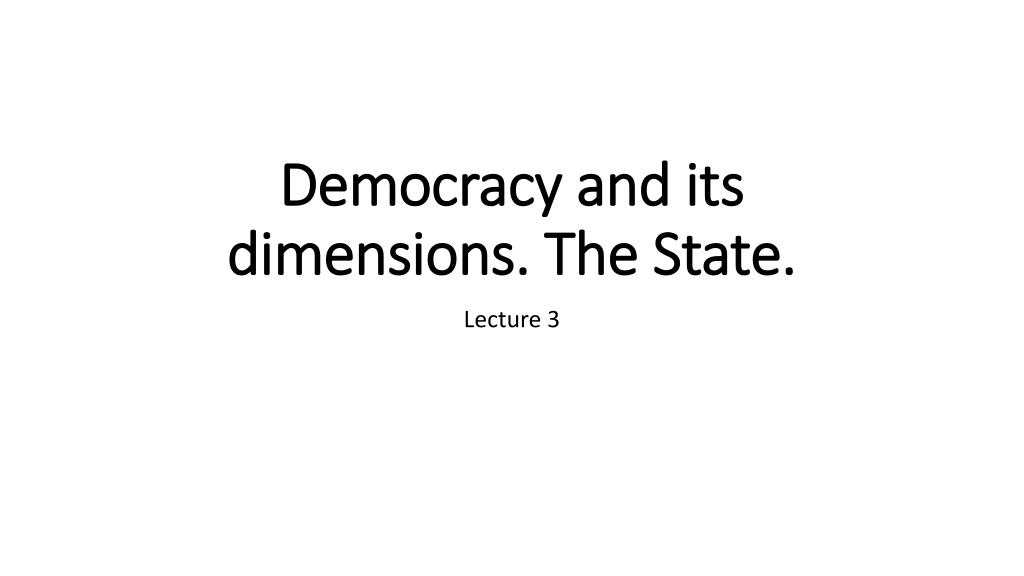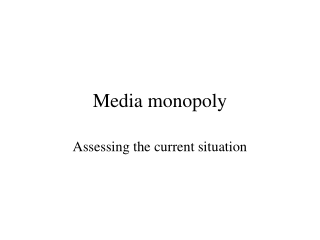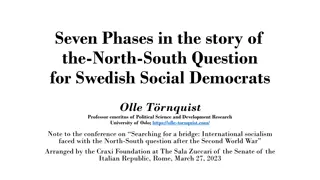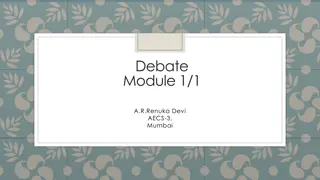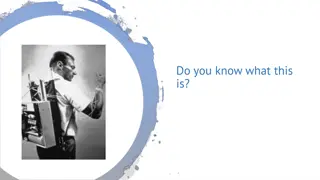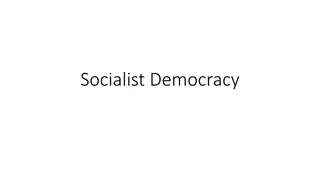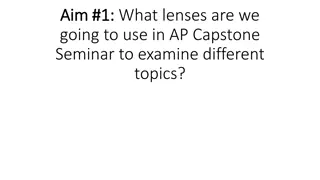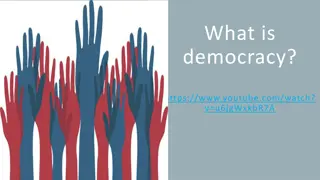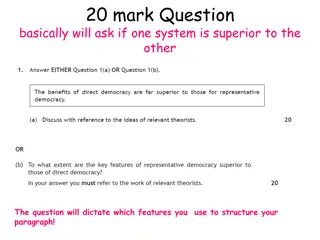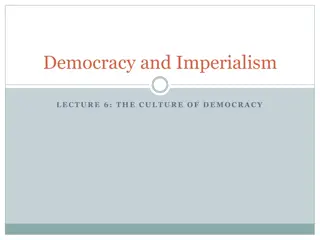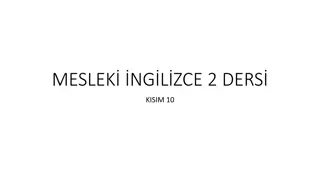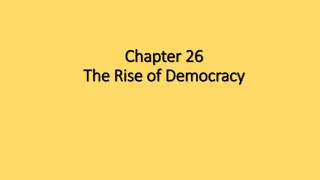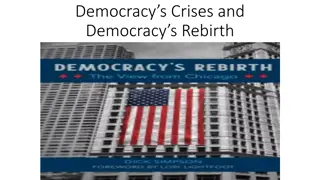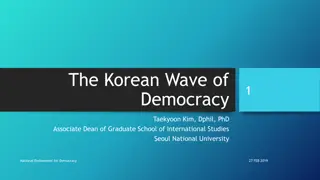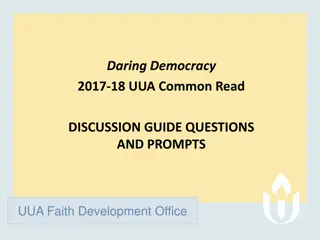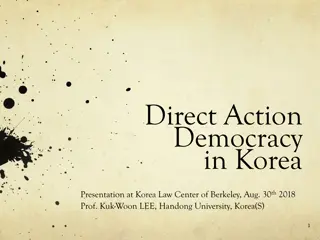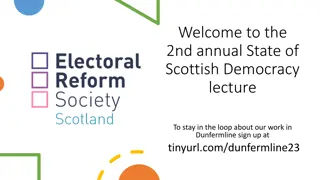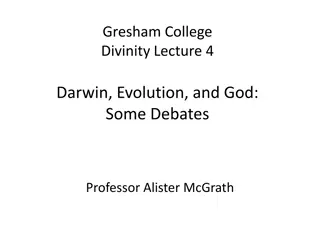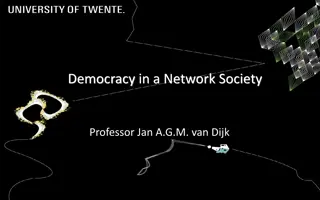Understanding Democracy: Evolution, Characteristics, and Debates
Democracy has evolved from being viewed pejoratively to a widely respected system of government. The concept of democracy has been scrutinized throughout history with discussions on its nature, different democratic models, and operational mechanisms. Key characteristics include rule by the people, equality of opportunity, welfare, minority rights, and popular voting. The political debate surrounds questions of who the people are and the extent of popular rule.
Download Presentation

Please find below an Image/Link to download the presentation.
The content on the website is provided AS IS for your information and personal use only. It may not be sold, licensed, or shared on other websites without obtaining consent from the author. Download presentation by click this link. If you encounter any issues during the download, it is possible that the publisher has removed the file from their server.
E N D
Presentation Transcript
Democracy Democracy and dimensions dimensions. . The and its The State. State. its Lecture 3
Defining Defining democracy democracy Democracy born in antiquity (Greece) At first viewed pejoratively (Plato, Aristotle) Up to XXth century considered mob rule Nowadays exteremely popular and respected all are democrats But what does this mean?
Defining Defining democracy democracy 2 2 issues issues to to examine examine How has the term democracy been used throughout history? What issues have been discussed in relation to the nature of democracy? What models of democratic rule have been invented? How about their advantages and disadvantages? How do democratic systems operate in practice? Does democracy really enables the people to rule?
The The main main characteristics characteristics of of democracy democracy a system of rule by the poor and disadvantaged a form of government in which people people rule directly An egalitarian society in terms of equality of opportunity and merit A system of welfare and redistribution fewer inequalities A decision-making proces in which the principle of majority rules A system guaranteeing the rights of minorities power of majority restricted A means of filling public offices through the popular vote A system of government that serves the interests of all citizens Abraham Lincoln s definition (Gettysburg Address 1864) the government of the people, by the people and for the people
Democracy Democracy debate debate The main questions around which the fierce ideological and political debat revolves Who are the people? In what sense should the people rule? How far should popular rule extend?
Who Who are are the the people people ? ? A principle of political equality one of the core features of democracy Every political system has restrictions regarding political participation In Greece only male citizens over 20 women, slaves and foreigners excluded XVIII and XIXth centuries exclusion of the poor and women Universal suffrage in the UK 1928, the USA 1960-ies, Poland-1918 In contemporary democratic systems children and some prisoners excluded The people all citizens or the majority who rule Normally they are members of nations; but cosmopolitan democracy also possible due to globalization (transnational citizenship)
How How should should the the people people rule rule? ? Various forms of political participation Direct democracy referendums (e. g. Switzerland), mass gatherings, interactive TV or the internet Indirect (representative) democracy the act of voting, choice of their representatives but elections must be competitive (who submites and selects the candidates), authentic, making politicians publicly accountable Totalitarian democracies a parody of democracy; rule for the people and not by the people; domination of the leader; submission to the leader plebiscitary democracy Which form of rule do you prefer? Why?
How How should should the the people people rule rule? (2) ? (2) Direct democracy Stricter control over citizens own matters Educates citizens making them more responsible and involved Easier expression of the public s own views and interests Rule is legitimate as people are more willing to respect their own decisions Representative democracy More realistic an approach to political life (direct democracy unrealistic) It relieves citizens of the burden of decision-making (a division of labour in politics), Government placed in the hands of better-educated, experienced, knowledgeable politicians It distances citizens from politics thus compromises more possible
How How far far should should popular popular rule rule extend extend? ? What issues to be decided by the people and what by individuals themselves? Liberal individualism democracy restricted only to narrow realm of political life (matters concerning community) the rest for citizens Democracy should be on guard of individual liberty with limited influence on autonomous individuals lives Radical democracy democracy as a universal principle to be used in any realm of social life (in economy socialists social democracy), family (feminists) , it favours decentralization, participation and dispersal of political power Democracy a friend of liberty not its enemy any decision can be made democratically be in matters of property or social structure
Models Models of of democracy democracy 1 1 Classical model of democracy Principle of popular self-government Direct democratic rule Athens a city-state in Greece High activity of citizens in Athens 40 meetings a year, public roles, decisions Critics e. g. Plato (The Republic) citizens lack competence and experience In fact the Athenian democracy restricted to a minority of inhabitants Slavery and the confinement of women made their participation possible At present this model exists in Switzerland (smaller cantons), in New England (USA) and
Models Models of of democracy democracy 2 2 Protective democracy Born in XVII-XVIII centuries to protect individual s liberty from the absolutist government Rooted in the individualist assumptions of liberalism the widest freedom for individual John Locke the right to vote based on natural rights (to life, freedom and property) Property key value citizens could defend themselves by creating a tax-setting body legislature only property owners could vote Democracy the government by consent operating through a representative assembly Jeremy Bentham (1748-1832) everybody seeks pleasure and avoids pain universal suffreage leads to the greatest happiness for the greatest number Consent the basis of protective democracy exercised through voting in elections, an agreement to be ruled or governed Protective democracy protecting citizens rights through separation of powers Individuals must be entirely responsible for their economic and social circumstances
Models Models of of democracy democracy 3 3 Developmental democracy -Interested in the widening scope of popular participation in democratic process - widens liberty and fosters personal growth development of individual and community - based on the theory by Jean-Jaques Rousseau (1712-1778) - one can achieve freedom and autonomy through participation in the life of community - freedom=obedience to general will (genuine interests of a collective body the common good) - participatory society one can achieve self-development by participating in the decisions that shape his.her life opennes, accountability and decentralization grass- roots democracy (New Left thinkers) - However Rousseau was criticized for distinguishing between true will and subjective will of citizens so it creates space for imposing it from above (dictator). - Deliberative (parliamentary) democracy milder version John Stuart Mill democracy as an educational experience for individuals
Models Models of of democracy democracy 4 4 People s democracy Invented in the orthodox communist regimes immitating the Soviet model Rejection of liberal models of (parliamentary) democracy Was based upon social equality achieved through common ownership Marx proletarian revolution will overthrown capitalist democracy, establish proletarian dictatorship and proletarian democracy Then the state will wither away in communist society Vladimir IIyich Lenin bolshevik party led proletariat, had wisdom, competence - the vanguard of the working class This gave the communist party unlimited power democracy only in theory in practice dictatorship
The The State State 1. The state is omnipresent in all spheres of life (public and private) 2. Key issues discussed in relation to the state: What is the state, and how can it be distinguished fro government? How has state power been analysed and explained? Is the state a for good or a force to evil? What roles have been assigned to the state? What is the responsibility of the state and civil society? How has globalization affected the role and power of the state? 3. What do you think the state is?
What What is is the the state? state? Understood in three different ways: Idealist perspective Georg W. F. Hegel state as ethical community the highest form of human s freedom uncritical approach reverence towards the state that later inspired Marxists, some liberals and fascists. Functionalist perspective the main role of the state uphold social order and maintain social stability through its institutions Organizational perspective set of institutions responsible for collective organization of social existence The state is the political organization that establishes sovereign jurisdiction within defined territorial borders and exercises authority (including the exclusive right to aplly coercion i. e. legitimate violence ) It is different than civil society embraces political executive in a narrow sense (government), legislative, judiciary, the bureaucracy, the military the police etc.
The The State and State and government government State more extensive than government. The latter constitutes part of the state. State permanent; government temporary Government realizes the state s goals ( the braines of the state ) State impersonal authority; Government personalized and ideologically involved. State represents the the common good (at least it should); Government represents sympathies of a particular political group
Rival Rival theories theories of of the the state state the pluralist state the state as an umpire , referee , arbiter; individual (in the state of nature) is selfish and dangerous without the state the state emerges as a result of social contract made by individuals to protect all; otherwise anarchy and destruction; political obligation the duty to obey the state; the basis of the state s right to rule; The capitalist state Marx based on the exploitation of the working class by the bourgoisie (the ruling class owners of the productive wealth); all states are class dictatorship - to be destroyed by the proletarian revolution neoMarxists the source of class opression lies in culture (ideological manipulation) not in economics The leviathan state self-serving monster, intent on expansion, enlarges its competences and powers; The New Right rejected that on the grounds of liberalism (the state as an umpire or arbiter not a nanny interfering with every aspect of human existence); government dominated by the state (its elite - officers and bureaucrats shapes thinking of elected politicians pursuing their own interests) The patriarchal state the state power springing from male domination in social institutions e. g. family and economic life; liberal feminists accept pluralistic view of the state; believe in a reformist way to full equality between men and women it is possible Radical feminists the state an institution of male power rooted in a deeper structure of women oppresion in the form of patriarchy (domination of men within the family and then in society causes gender inequality); it should be eradicated traditional structures of society removed in favour of gender equality
The The role of role of the the state state The minimal state The developmental state The social democratic state The collectivized state The totalitarian state
Conclusions Conclusions There is at least several models of democracy that rival each other namely classical democracy, protective democracy, developmental democracy and people s democracy Liberal democracy is definitely the most popular model of democracy nowadays There are rival theories of the state such as pluralist, Marxist, The New Right and feminist. The state has fulfilled many roles in the history of mankind as a minimal, developmental, social-democratic, collectvized and totalitarian state.
